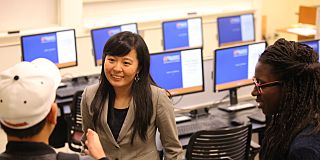Entrepreneurs are made, not born.
Entrepreneurship minors are relentlessly resourceful. If you want to learn how to seize the moment to improve processes, solve problems, or capitalize on opportunities, this minor may be right for you. Are you curious about new sustainable models for improving lives and making the world healthier, more resilient, and more just? In our program, you’ll learn how to question the status quo to achieve goals and deftly navigate ambiguity. Finally, you’ll hone your skills, operating in a collaborative community, valuing teamwork and partnerships, and learning that you can’t do it all alone.
Entrepreneurship Minors at UVA create value of all kinds and positively impact the world we live in—as founders, investors, policymakers, technologists, executives, team members in startups, and more. They serve in these vital roles throughout the new venture community, including not only startup companies, but also new ventures operating within or launched by established firms and not-for-profit organizations. The program provides an education in and experience with the tools, techniques, and transformations involved in new venture development (e.g., ideation and innovation, team building, product-market fit, financial and social return, and operational dynamics).
Some examples of topics covered in the minor include:
-
Insight development: As-is analysis, problem identification, and intended results
-
Winning solutions: Ideation, design thinking, and problem-solution fit
-
Management and operations: Team building and creating business models
-
Financial and social return: Venture capital, venture philanthropy, and impact investing
-
Change management: Executing widespread organizational change under conditions of uncertainty and intense, competitive pressure
While administratively hosted within the McIntire School of Commerce, the Entrepreneurship Minor connects entrepreneurship efforts among multiple schools at the University of Virginia through a coordinated and collective curriculum. You can choose one of three concentrations within the minor:
|
Innovation in Business |
Social Entrepreneurship |
Technology Entrepreneurship |
|
Supported by coursework at the McIntire School of Commerce |
Supported by coursework at the Frank Batten School of Leadership and Public Policy |
Supported by coursework at the School of Engineering & Applied Science |
Acceptance into and declaration of the minor do not guarantee enrollment in its courses or completion of the minor. All courses are offered on a space-available basis. As a result, we will ask you to express a preference for your concentration on the application (as well as your second choice), as there may be a limited number of spaces in any or all concentrations to ensure class availability for declared minors within the concentration. Students may not switch concentrations once admitted to the minor.
Engineering students may not enroll and complete both the Engineering Business Minor and the Entrepreneurship Minor.
Application Process and Timeline
- Eligibility: To be considered for the minor, you must have completed or be enrolled in ENTP 1010: Startup and be in good academic standing according to your school of enrollment.
- Timeline: The application is available Nov. 1, 2024, and is due Monday, Feb. 24, 2025, at noon. Late applications will not be accepted under any circumstances. Decisions will be released on March 21, 2025.
- Application components: The application includes 1) your academic information (transcript), 2) a summary of three meaningful activities, and 3) two short essay prompts.



